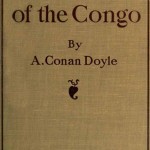The keen eye of the little commander had seen the surface ripple, which told of a passing breeze. He had used it to dart across the big Frenchman and to rake her with every gun as he passed. But, once past her, the Leda had to come back into the wind to keep out of shoal water. The man[oe]uvre brought her on to the starboard side of the Frenchman, and the trim little frigate seemed to heel right over under the crashing broadside which burst from the gaping ports. A moment later her topmen were swarming aloft to set her topsails and royals, and she strove to cross the Gloire’s bows and rake her again. The French captain, however, brought his frigate’s head round, and the two rode side by side within easy pistol-shot, pouring broadsides into each other in one of those murderous duels which, could they all be recorded, would mottle our charts with blood.
In that heavy tropical air, with so faint a breeze, the smoke formed a thick bank round the two vessels, from which the topmasts only protruded. Neither could see anything of its enemy save the throbs of fire in the darkness, and the guns were sponged and trained and fired into a dense wall of vapour. On the poop and forecastle the marines, in two little red lines, were pouring in their volleys, but neither they nor the sea-men-gunners could see what effect their fire was having. Nor, indeed, could they tell how far they were suffering themselves, for, standing at a gun, one could but hazily see that upon the right and the left. But above the roar of the cannon came the sharper sound of the piping shot, the crashing of riven planks, and the occasional heavy thud as spar or block came hurtling on to the deck. The lieutenants paced up and down the line of guns, while Captain Johnson fanned the smoke away with his cocked-hat and peered eagerly out.
“This is rare, Bobby!” said he, as the lieutenant joined him. Then, suddenly restraining himself, “What have we lost, Mr. Wharton?”
“Our maintopsail yard and our gaff, sir.”
“Where’s the flag?”
“Gone overboard, sir.”
“They’ll think we’ve struck! Lash a boat’s ensign on the starboard arm of the mizzen cross-jackyard.”
“Yes, sir.”
A round-shot dashed the binnacle to pieces between them. A second knocked two marines into a bloody, palpitating mash. For a moment the smoke rose, and the English captain saw that his adversary’s heavier metal was producing a horrible effect. The Leda was a shattered wreck. Her deck was strewed with corpses. Several of her portholes were knocked into one, and one of her eighteen-pounder guns had been thrown right back on to her breech, and pointed straight up to the sky. The thin line of marines still loaded and fired, but half the guns were silent, and their crews were piled thickly round them.
“Stand by to repel boarders!” yelled the captain.
“Cutlasses, lads, cutlasses!” roared Wharton.
“Hold your volley till they touch!” cried the captain of marines.
The huge loom of the Frenchman was seen bursting through the smoke. Thick clusters of boarders hung upon her sides and shrouds. A final broadside leapt from her ports, and the mainmast of the Leda, snapping short off a few feet above the deck, spun into the air and crashed down upon the port guns, killing ten men and putting the whole battery out of action. An instant later the two ships scraped together, and the starboard bower anchor of the Gloire caught the mizzen-chains of the Leda upon the port side. With a yell the black swarm of boarders steadied themselves for a spring.
But their feet were never to reach that blood-stained deck. From somewhere there came a well-aimed whiff of grape, and another, and another. The English marines and seamen, waiting with cutlass and musket behind the silent guns, saw with amazement the dark masses thinning and shredding away. At the same time the port broadside of the Frenchman burst into a roar.
“Clear away the wreck!” roared the captain. “What the devil are they firing at?”
“Get the guns clear!” panted the lieutenant. “We’ll do them yet, boys!”
The wreckage was torn and hacked and splintered until first one gun and then another roared into action again. The Frenchman’s anchor had been cut away, and the Leda had worked herself free from that fatal hug. But now, suddenly, there was a scurry up the shrouds of the Gloire, and a hundred Englishmen were shouting themselves hoarse: “They’re running! They’re running! They’re running!”
And it was true. The Frenchman had ceased to fire, and was intent only upon clapping on every sail that he could carry. But that shouting hundred could not claim it all as their own. As the smoke cleared it was not difficult to see the reason. The ships had gained the mouth of the estuary during the fight, and there, about four miles out to sea, was the Leda’s consort bearing down under full sail to the sound of the guns. Captain de Milon had done his part for one day, and presently the Gloire was drawing off swiftly to the north, while the Dido was bowling along at her skirts, rattling away with her bow-chasers, until a headland hid them both from view.
But the Leda lay sorely stricken, with her mainmast gone, her bulwarks shattered, her mizzen-topmast and gaff shot away, her sails like a beggar’s rags, and a hundred of her crew dead and wounded. Close beside her a mass of wreckage floated upon the waves. It was the stern-post of a mangled vessel, and across it, in white letters on a black ground, was painted, “The Slapping Sal.”
“By the Lord! it was the brig that saved us!” cried Mr. Wharton. “Hudson brought her into action with the Frenchman, and was blown out of the water by a broadside!”
The little captain turned on his heel and paced up and down the deck. Already his crew were plugging the shot-holes, knotting and splicing and mending. When he came back, the lieutenant saw a softening of the stern lines about his eyes and mouth.
“Are they all gone?”
“Every man. They must have sunk with the wreck.”
The two officers looked down at the sinister name, and at the stump of wreckage which floated in the discoloured water. Something black washed to and fro beside a splintered gaff and a tangle of halliards. It was the outrageous ensign, and near it a scarlet cap was floating.
“He was a villain, but he was a Briton!” said the captain, at last. “He lived like a dog, but, by God, he died like a man!”




